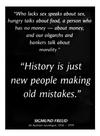You are using an out of date browser. It may not display this or other websites correctly.
You should upgrade or use an alternative browser.
You should upgrade or use an alternative browser.
Freud comments on immoral oligarchs and humanity's inability to learn from past mistakes.
- Thread starter JGeropoulas
- Start date
I 'm a bit surprised you posted that because I know, that you know it's more complex than that and that Freud is a part of the control programme.
If knowledge would not be suppressed I don't think people would made the same old mistakes. I read this as a sarcastic sentence from Freud, something like: "History is just fresh meat making dinner of the rich and having no choice".
If knowledge would not be suppressed I don't think people would made the same old mistakes. I read this as a sarcastic sentence from Freud, something like: "History is just fresh meat making dinner of the rich and having no choice".
JGeropoulas
The Living Force
You're right, the truth is certainly complex. So much so that it's hard to imagine a single quote capable of capturing it. For me, if a quote concisely expresses--preferably with a little punch--just one aspect of the truth, I value it. My interpretation of these two quotes would be: bankers and oligarchs are psychopaths; and SSDD.I 'm a bit surprised you posted that because I know, that you know it's more complex than that and that Freud is a part of the control programme.
If knowledge would not be suppressed I don't think people would made the same old mistakes. I read this as a sarcastic sentence from Freud, something like: "History is just fresh meat making dinner of the rich and having no choice".

JGeropoulas
The Living Force
Absolutely! Of all I learned in grad school 40 years ago--much now revised or forgotten, two keys of wisdom I've held onto were the two mottos of that school: "All truth is God's truth" and "God can draw a straight line with a crooked stick". As I type this, others in a similar vein come to mind: "Perfect is the enemy of good." (Voltaire) and "Don't throw the baby out with the bathwater"Still, it is interesting. And with knowledge, we can weed, right?

What is true for sure is that the PTB base a part of its control on young persons. I mean there's always new preys ready to buy what the PTB sell, having no idea of the man behind the scene.
It's hard for the preys to do differently because parents are not aware too or, if they are with the experience, they are not able to stop what is sold to their children.
fwiw
It's hard for the preys to do differently because parents are not aware too or, if they are with the experience, they are not able to stop what is sold to their children.
fwiw
Goemon_
The Living Force
Absolutely! Of all I learned in grad school 40 years ago--much now revised or forgotten, two keys of wisdom I've held onto were the two mottos of that school: "All truth is God's truth" and "God can draw a straight line with a crooked stick". As I type this, others in a similar vein come to mind: "Perfect is the enemy of good." (Voltaire) and "Don't throw the baby out with the bathwater"
Quotes, quotes, quotes...Sort of an ironic comment (the Freud quote about people obsessing over what they lack) when you think about some of the things Feud was obsessed by.
There is a French historian, Marion Sigaut, which, among other things, read correspondences of Voltaire. She basically says that he was practicing the contrary to what the quotes says. Kind of "Do as I say not as I do."
JGeropoulas
The Living Force
Voltaire said, "Perfect is the enemy of good" meaning a rigid quest for what's perfect can blind someone to valuing--or even recognizing--imperfect things that are still really good. So by "practicing the contrary," Voltaire tended to seek perfect answers/solutions/ideas to the point of rejecting good answers/solutions/ideas?Quotes, quotes, quotes...
There is a French historian, Marion Sigaut, which, among other things, read correspondences of Voltaire. She basically says that he was practicing the contrary to what the quotes says. Kind of "Do as I say not as I do."
Goemon_
The Living Force
Possibly, basically.Voltaire said, "Perfect is the enemy of good" meaning a rigid quest for what's perfect can blind someone to valuing--or even recognizing--imperfect things that are still really good. So by "practicing the contrary," Voltaire tended to seek perfect answers/solutions/ideas to the point of rejecting good answers/solutions/ideas?
Quite certainly his most famous quote "I do not agree with what you have to say, but I'll defend to the death your right to say it." seems to be contrary to what he was doing, that is, going after people with different ideas to the point of making their lives miserable.
If my memory serves Marion Sigaut also talks about quotes taken from Voltaire's redacted version of his books (more available than the non-redacted ones) where the said original quotes have a very different meaning.
JGeropoulas
The Living Force
Good to know, but I'm curious. Do you know why his books were "redacted", and by whom?Possibly, basically.
Quite certainly his most famous quote "I do not agree with what you have to say, but I'll defend to the death your right to say it." seems to be contrary to what he was doing, that is, going after people with different ideas to the point of making their lives miserable.
If my memory serves Marion Sigaut also talks about quotes taken from Voltaire's redacted version of his books (more available than the non-redacted ones) where the said original quotes have a very different meaning.
Goemon_
The Living Force
Whom?: Condorcet. (still according to Marion Sigaut)Good to know, but I'm curious. Do you know why his books were "redacted", and by whom?
Why?: I guess to not tarnish the enlightenment ideology.


